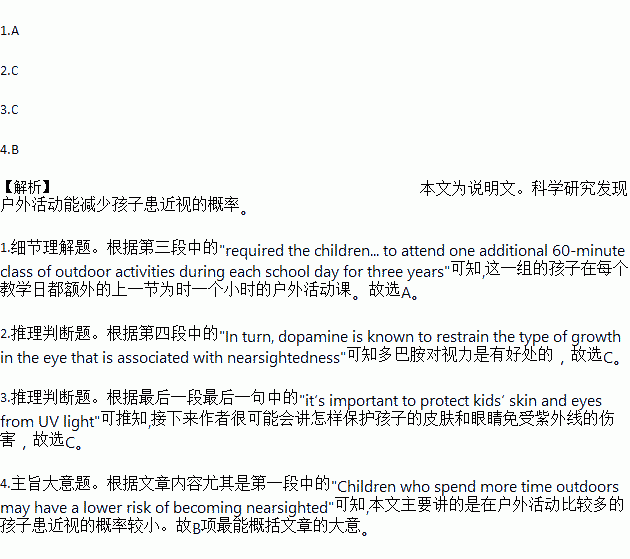题目内容
Children who spend more time outdoors may have a lower risk of becoming nearsighted, new research suggests.
In the study, researchers looked at about 1,900 schoolchildren. The scientists found that the kids who had been instructed to spend more time outdoors over three years were 23 percent less likely to develop nearsightedness during this time than those who had not been instructed to spend more time outdoors. Moreover, among the kids who did become nearsighted during the study, the degree to which their eyesight worsened was slightly smaller among those who spent more time outdoors.
The researchers selected six schools and required the children, whose average age was 7 at the start of the study, to attend one additional 60-minute class of outdoor activities during each school day for three years. The parents of these children were also encouraged to engage their children in outdoor activities after school, especially during weekends and holidays. The other half of the children, from another six schools, continued their usual activity patterns. After three years, 30.4 percent of the kids in the intervention(干预) group had become nearsighted, compared with 38.5 percent of the kids in the other group.
It is not clear exactly why spending more time outside would benefit children’s eyesight, the researchers said. However, some research has suggested that the higher levels of light intensity found outdoors may increase the release of the chemical dopamine(多巴胺) of the eye. In turn, dopamine is known to restrain(抑制) the type of growth in the eye that is associated with nearsightedness.
Based on the new results, the researchers recommend that children spend more time outdoors because of the potential benefits to their eyesight. However, it’s important to protect kids’ skin and eyes from UV light, which can be damaging.
1.What did the children in the intervention group do during each school day?
A. Attend an extra class of outdoor activities.
B. Continue to do their usual activities.
C. Spend one hour in doing eye exercises.
D. Participate in outdoor activities with parents.
2.What can be inferred about the chemical dopamine?
A. It can contribute to poor sight.
B. It can damage people’s brain.
C. It is beneficial to eyesight.
D. It means low levels of light intensity.
3.What may be discussed in the following paragraph?
A. How to design outdoor activities for kids.
B. How to prevent kids becoming nearsighted.
C. How to protect kids’ skin and eyes from UV light.
D. How to encourage kids to join in outdoor activities.
4.Which can serve as the best title for the passage?
A. The More Time Outdoors, the Better
B. Kids May See Better if They Play Outside
C. It’s Time to Engage Kids in Outdoor Activities
D. Researchers Found a Cure for Nearsightedness
 阅读快车系列答案
阅读快车系列答案
